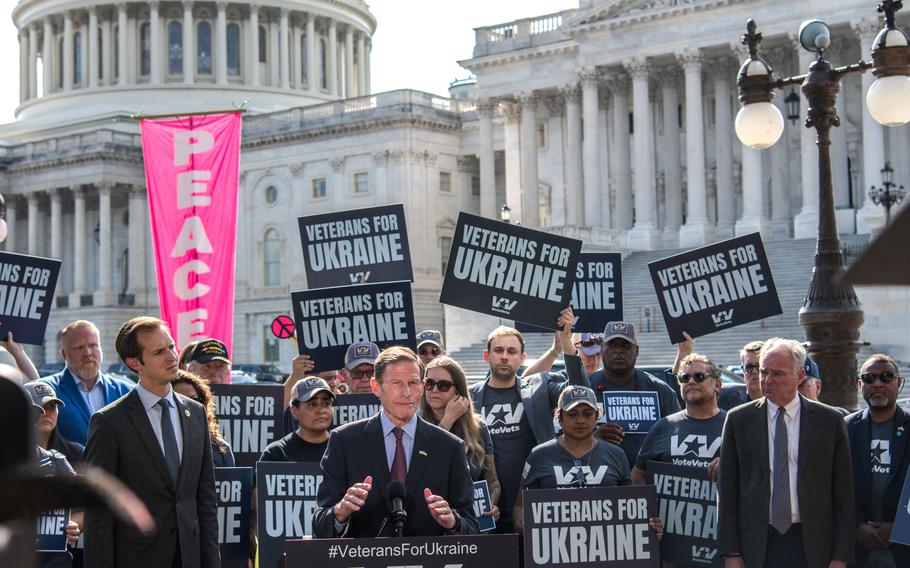
Sen Richard Blumenthal, D-Conn., speaks outside the U.S. Capitol calling for continued military support for Ukraine. Lawmakers Rep. Jake Auchincloss, D-Mass., left and Sen. Tim Kaine, D-Va., right, stand among votevets.org veterans for Ukraine demonstrators holding up signs behind Blumenthal. (Carlos Bongioanni/Stars and Stripes)
U.S. funding for Ukraine faces a new hurdle in Congress after Representative Kevin McCarthy’s ouster as House speaker gave Republican hard-liners an opening to stall the next round of aid to Kyiv.
The fate of U.S. assistance for Ukraine’s efforts to fend off Russia’s invasion now rests in large part on the next speaker, who will have to navigate a party sharply divided on the issue. Republicans plan a speaker election on Oct. 11, and all legislative action is likely to halt in the meantime.
Aid to Ukraine in its fight against Russia’s invasion still enjoys widespread support in Congress. Some of those mentioned as possible speakers, including House Majority Leader Steve Scalise, voted for a $300 million Ukraine funding bill last week.
Yet other contenders for speaker, like Judiciary Chairman Jim Jordan, voted no. Jordan on Thursday said he would, if elected speaker, block new Ukraine aid.
The leader of the GOP hardliners who ousted McCarthy on Tuesday, Representative Matt Gaetz, emphasized that a majority of House Republicans voted against the aid bill last week.
All of this domestic political maneuvering has fueled anxiety among Ukraine’s allies that American support for the war effort has started to waver.
President Joe Biden held a call with allies Tuesday — before McCarthy’s ouster — to reassure them of continued U.S. support for Ukraine, after the stopgap bill keeping the government open through Nov. 17 omitted the $24 billion requested by the president and the $6 billion in a Senate-proposed compromise.
“There’s enough support from Republicans in the House — not just members, although that is included, but leaders — that the president remains confident that we’ll continue to get the support we need,” National Security Council spokesman John Kirby said Tuesday.
Earlier: Biden speaks with allies to assure them of Ukraine support
Many senators in both parties told Bloomberg News they are determined to provide aid to Ukraine quickly, but there’s no consensus on how, especially with the House in turmoil and the Senate leaving for another recess. Here are some of the paths to funding Ukraine:
Border-Ukraine deal
Gaetz, who opposes any more aid to Ukraine, chafed at McCarthy’s gambit of tying future aid to a demand for action on U.S. border security, saying the two issues shouldn’t be linked.
Despite Gaetz’s criticism, Democrats and Biden could still agree to some immigration changes in a deal, whether tacit or overt, for Ukraine aid. Senators in both parties huddled last week to try and hash out such an accord, including Republican Lisa Murkowski of Alaska and independent Kyrsten Sinema of Arizona.
Democrats generally support additional funding for border security but are reluctant to limit asylum claims, especially absent an immigration-policy overhaul that has eluded Congress for decades.
Republicans said they want policy changes, not just more spending.
Senate supplemental
Some Democrats want quick action. In theory, Senate Majority Leader Chuck Schumer could force votes by supersizing the modest $300 million Ukraine package the House passed last week and send it back to the House.
But Republican senators also are newly reluctant to act on Ukraine without dealing with the US border, lest they face accusations of caring more about Ukraine’s border than the U.S. one. Even if the Senate were to pass a Ukraine-only bill, the next speaker would have to agree to bring it up for a vote, or else a band of House Republicans would have to join Democrats to force a vote via a complicated and rarely used process.
“The idea that House Republicans would drive a Ukraine funding bill right now is just preposterous,” Republican Senator JD Vance of Ohio said even before McCarthy’s ouster. Vance said Ukraine funding is “a massive political loser, especially for Republicans.”
Defense spending bill
Senator Susan Collins, the top Republican appropriator and a strong supporter of Ukraine, said Saturday that another possibility would be to tie a Ukraine package to the annual defense spending bill. The defense package is typically one of the most popular in Congress, but getting agreement between House and Senate versions could take weeks or months. Democrats also tend to be reluctant to finish action on defense spending first at the risk of giving up leverage on domestic priorities.
Go big
One idea suggested by Ukraine supporters — such as Republican Senator Lindsey Graham of South Carolina and Democratic Senator Ben Cardin of Maryland — would be for the White House to pitch a much larger Ukraine package intended to last a year or more - and potentially through the 2024 election.
The rationale: The risk for Ukraine is that Congress will agree to a stopgap package only for funding to run out in the middle of the presidential campaign, when passing any legislation will become more difficult.
With assistance from Erik Wasson, Laura Litvan and Billy House.